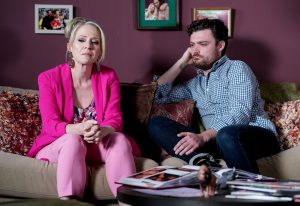In a gripping and emotional early iPlayer release, EastEnders delivered one of the most pivotal turning points in recent memory as Linda Carter, the long-standing landlady of The Queen Vic, makes the heart-wrenching decision to walk away from the pub that has defined much of her adult life. After years of hardship, trauma, loss, and emotional labor, Linda’s final choice is not just a reflection of her exhaustion but a declaration of self-preservation and independence. Her journey—from bubbly barmaid to broken widow, devoted mother, and eventually a woman carrying the weight of her entire family’s legacy—has been one of the show’s most powerful and enduring arcs. But now, she’s done. Linda Carter is choosing herself.
The decision comes after a series of escalating crises. Most recently, her mother Elaine, in a bid to throw a party for the children of Albert Square, serves alcoholic punch—unintentionally—but the result is horrifying. Several children become ill, leading to panic, emergency services, and eventually, a police investigation. The mistake puts The Queen Vic’s license at risk and the family’s reputation in tatters. Though Elaine insists it was an accident, Linda is forced to shoulder the blame in the eyes of the community. Already overwhelmed, already carrying the grief of Mick’s presumed death, the trauma of past sexual assault, the stress of raising her children largely alone, and the guilt surrounding Keanu’s demise—this incident is the final straw.
The episode is carefully constructed, allowing viewers to witness Linda’s unraveling not through screaming matches or over-the-top drama, but through small, telling moments. Her voice breaks as she quietly tells Johnny, her son, that she’s “done.” Not with life, not with love—but with the endless burden of holding The Vic together, of keeping up appearances, of pretending she’s strong when inside she’s slowly falling apart. The scene between mother and son is raw and intimate, a welcome return to the emotional storytelling that has defined EastEnders at its best.
For Linda, The Queen Vic has been more than a workplace—it’s been a prison and a pedestal. The place where she laughed with Mick and made memories with their children. The place where she was assaulted by Dean Wicks. The place where she drank herself into oblivion trying to forget. The place she sobered up and tried to start again. And finally, the place where Mick disappeared forever, leaving behind nothing but memories and a ghost that haunts every corner of the bar. Staying in the Vic means reliving all those moments, day in and day out. Her decision to leave is a rejection of that cycle. It’s the first time Linda Carter has allowed herself to admit: she deserves a future that isn’t rooted in the past.
When she tells Elaine about her decision to sell, the confrontation is immediate and fierce. Elaine, a proud and often overbearing matriarch, explodes in disbelief and denial. “Over my dead body!” she snaps, clinging to the idea that the Carter family legacy must continue no matter the cost. But Linda doesn’t back down. For once, she doesn’t soften her words to protect others. She speaks with clarity: “This place is killing me, Mum. I can’t do it anymore.” The moment is liberating. In standing her ground, Linda isn’t just letting go of a building—she’s reclaiming her power.
The episode leaves the future of The Queen Vic in flux. Who will buy it? Will it be a familiar face like Sharon or Alfie, or a brand-new character looking to shake up Albert Square? More importantly, what becomes of Linda once she walks away? Does she leave the Square entirely or begin a new chapter within it—one where she isn’t defined by her past relationships or family obligations?
Viewers have reacted with overwhelming support for Linda’s decision. Social media exploded with praise for Kellie Bright’s performance, which was understated but gut-wrenching. Many fans expressed that Linda’s choice was long overdue, that the character had been pushed to the breaking point for too long. Others drew parallels between Linda and iconic EastEnders women of the past—like Peggy Mitchell and Pat Butcher—who also had to decide when to put themselves first after years of putting everyone else ahead.
